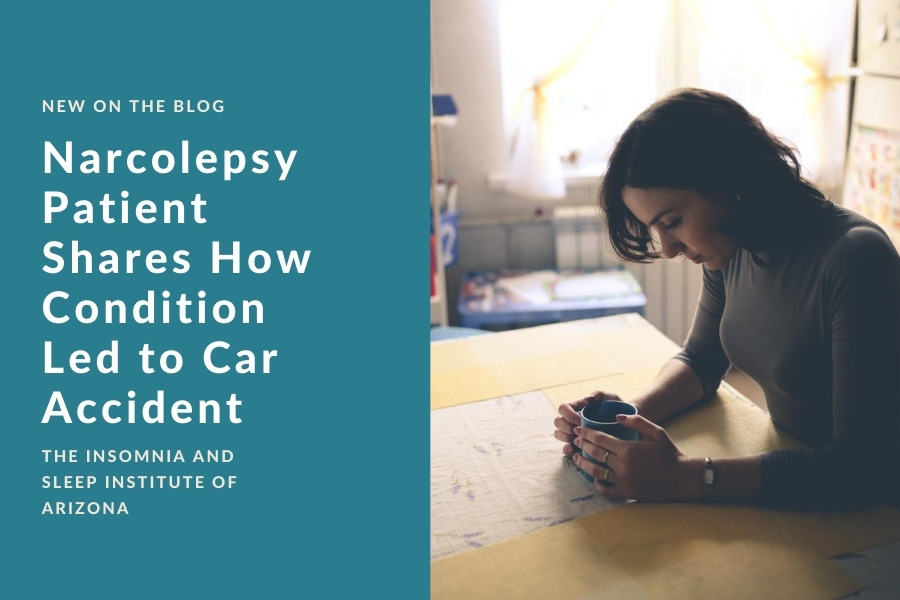Narcolepsy, a condition that has hypersomnia as a symptom, is a condition that is often exaggerated in the media—but sometimes the image of a person quickly and spontaneously falling asleep in dangerous situations is true. At The Insomnia and Sleep Institute of Arizona, we are led by triple-board certified Dr. Ruchir P. Patel, the current Physical Director elected Board President of the Maricopa County Medical Society. We are proud to be the Face of Sleep Medicine in Arizona and are driven by outcomes, which begins with a correct diagnosis. Treating all sleep disorders, including narcolepsy, we are staffed exclusively by sleep specialists who concentrate in sleep medicine and patients enjoy unprecedented access to leading experts in the field.
Earlier this year, WebMD (followed by Sleep Review) published a story by Matthew Morchower, who shared his experience with narcolepsy. The medically-reviewed narrative opens with him describing how he “snapped back to consciousness” behind the wheel to discover that he had been driving on the wrong side of the road. Seeing cars headed directly at him, he veered away—and directly into a telephone pole. The cliched image of his loved ones flashed through his brain before the airbag saved his life. Morchower shares, “In shock, I stumbled out of the car, sat down on the gravel, and considered whether I should stop driving forever.”
Living with Narcolepsy
Although it was Morchower’s first narcolepsy-related car accident, the symptoms were not a total surprise. He reports having intense daytime drowsiness and “sleep attacks” that ranged anywhere from “nodding off” to fully going to sleep for, and these symptoms had been going on for two years before the crash. However, he was not diagnosed with narcolepsy. He thought such drowsiness was common, especially with stress and work demands. However, two weeks after the crash, his friend was driving them both for a hike when he shared his experience. Morchower is fortunate that his friend was a physician—and demanded that he see a sleep specialist immediately. Morchower resisted, insistent that he was just working too much. After all, he had already mentioned the sleepiness to his own GP, who wrote it off as needing more sleep or perhaps depression (though there were no tests or referrals for depression treatment).
Morchower told his MD friend that if his doctor wasn’t worried, there was no need to be. This is where the conversation ended—at least for Morchower. What he remembers next is his friend yelling his name and shaking him. He had fallen asleep mid-argument. His friend said, “You see the irony, right? You just fell asleep from narcolepsy while telling me you don’t have narcolepsy.” Morchower saw a sleep specialist next week and immediately underwent an overnight polysomnogram (PSM) study to measure brain waves, movements, and vital signs. A multiple sleep latency test (MSLT) followed. Narcolepsy was the diagnosis, and Morchower became one of 250,000 diagnosed cases in the U.S. About one in every 2,000 people have this sleep disorder, though many are undiagnosed. Some sleep specialists estimate that the actual number of people with narcolepsy in the country is 500,000.
The Trouble with Narcolepsy and Other Sleep Disorders
Morchower’s situation is not unique. He had brought up the issue with his own doctor, but it was brushed aside and misdiagnosed. A lot of GPs are not educated and equipped to spot sleep disorders, particularly those that are not as common as insomnia or obstructive sleep apnea. In many cases, a referral is needed for a sleep specialist, but that is not the case at The Insomnia and Sleep Institute. However, the fault doesn’t fall entirely on GPs, but also on the patients. Not all narcolepsy presents as severely as Morchower’s. If you’re not falling asleep behind the wheel, but instead experiencing things like extreme drowsiness, you may not think to bring it up to any doctor.
There are many comorbidities to narcolepsy, such as anxiety. It can be a dangerous, life-threatening condition at worse and seriously disrupt every facet of your life at best. If you are struggling with any type of sleep issues, getting immediate help is critical. Contact The Insomnia and Sleep Institute today to schedule your no-referral consultation with a sleep specialist. You can call our office or, for the quickest reply, start a chat during business hours or fill out the online form.





